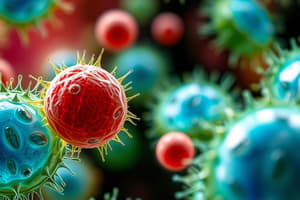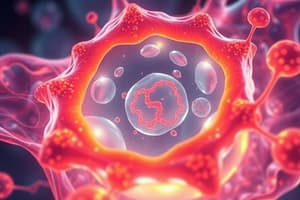Podcast
Questions and Answers
What is the function of the plasma membrane in a cell?
What is the function of the plasma membrane in a cell?
- Stores genetic information
- Regulates the exchange of molecules between the cell and its environment (correct)
- Synthesizes proteins
- Generates energy for the cell
Who among the following scientists did NOT contribute to the establishment of the cell theory?
Who among the following scientists did NOT contribute to the establishment of the cell theory?
- Matthias Schleiden
- Rudolf Virchow
- Antonie van Leeuwenhoek (correct)
- Theodor Schwann
Which organelle is responsible for producing energy in a cell?
Which organelle is responsible for producing energy in a cell?
- Nucleus
- Mitochondria (correct)
- Ribosomes
- Endoplasmic reticulum
What is the role of ribosomes in a cell?
What is the role of ribosomes in a cell?
What is the primary function of chloroplasts in plant cells?
What is the primary function of chloroplasts in plant cells?
Which process is essential to growth, repair, and reproduction of cells?
Which process is essential to growth, repair, and reproduction of cells?
What is the outcome of meiosis in sexual reproduction?
What is the outcome of meiosis in sexual reproduction?
Why do researchers use tools like microscopes and molecular biology techniques to study cells?
Why do researchers use tools like microscopes and molecular biology techniques to study cells?
How does studying cells benefit fields like medicine, biotechnology, and agriculture?
How does studying cells benefit fields like medicine, biotechnology, and agriculture?
Study Notes
Cells: The Building Blocks of Life
Cells are at the heart of biology, serving as the fundamental unit of life. They're remarkable structures designed to house, maintain, and carry out the functions of living organisms. Let's delve into the fascinating world of cells, exploring their anatomy, functions, and the importance of their study.
Origins and Discovery
Our understanding of cells began in the 17th century with the work of Dutch microscopist Antonie van Leeuwenhoek, who first observed tiny, living structures in water samples. In the 19th century, scientists like Theodor Schwann, Matthias Schleiden, and Rudolf Virchow established the cell theory: cells are the basic units of living organisms, arise only from preexisting cells, and contain the hereditary information necessary for life.
Structure and Organization
Cells come in various shapes and sizes, from simple, single-celled organisms like bacteria to complex, multicellular organisms like humans. A typical cell is encased in a protective membrane, called the plasma membrane, which regulates the exchange of molecules between the cell and its environment. Inside the cell, we find several organelles, or specialized structures, each with its specific function, such as the nucleus, mitochondria, endoplasmic reticulum, and ribosomes.
Cell Functions
Cells carry out a wide range of functions essential to life. They process and transport nutrients and waste products, convert energy, maintain homeostasis, reproduce, and communicate with other cells. For example, chloroplasts in plant cells convert sunlight into chemical energy through the process of photosynthesis, while red blood cells in animals transport oxygen and carbon dioxide.
Cell Division and Reproduction
Cell division, or mitosis, is the process by which cells produce new cells with the same number and type of chromosomes as the parent cell. Mitosis is essential to growth, repair, and reproduction. In sexual reproduction, cells undergo a more complex process known as meiosis, which results in the formation of gametes (sex cells) with half the normal number of chromosomes.
Studying Cells
Researchers study cells to understand the fundamental processes of life, from the molecular level to the whole organism. To study cells, scientists use tools such as the microscope, molecular biology techniques, and imaging technologies like electron microscopy. In addition, they develop theories, models, and hypotheses to explain cellular processes, which are tested through experiments and peer-reviewed publications.
Importance of Studying Cells
Understanding cells, their functions, and how they interact with one another is crucial to various fields of science, including medicine, biotechnology, and agriculture. For example, cell biology research has led to the discovery of new treatments for diseases, the development of biotechnological tools, and the creation of genetically modified organisms for environmental and agricultural applications.
In summary, cells are the building blocks of life, each containing specialized structures and carrying out essential functions. Studying cells advances our understanding of biology, leading to new discoveries and innovations that benefit humanity.
Studying That Suits You
Use AI to generate personalized quizzes and flashcards to suit your learning preferences.
Description
Delve into the fascinating world of cells, exploring their anatomy, functions, and the importance of their study. Learn about the origins and discovery of cells, their structure and organization, functions, cell division, and the significance of studying cells.




